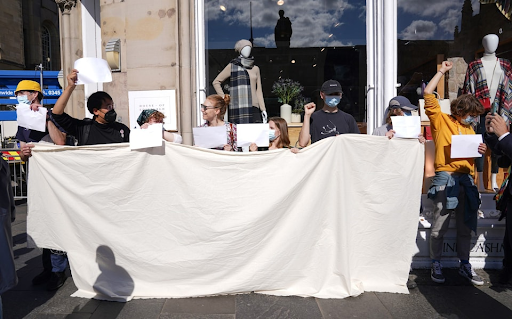Following the death of her Majesty Queen Elizabeth II, thousands thronged the streets to showcase their love and respect for the late monarch. However, some protested the existence of the monarchy during the procession of the Queen’s coffin and at events held to proclaim King Charles III as Britain’s new monarch.
A 22-year-old man who shouted at the Duke of York in Edinburgh has now been charged in connection with a breach of the peace after Prince Andrew was heckled during the procession of the Queen’s coffin on Monday. The man was then tackled and shoved to the ground by two bystanders before being restrained by the police. He is then seen raising his hands, telling the police that he has done nothing wrong. In another instance in Edinburgh, a 22-year-old woman was charged with a breach of the peace after holding up anti-monarchy posters outside St Giles’ Cathedral.
In Oxford, a man named Symon Hill was arrested on suspicion of a public order offence after shouting “Who elected him?” during another accession proclamation. He was later released after Thames Valley Police said he was assisting officers “voluntarily.”
In response to these recent arrests of protesters, anti-monarchy demonstrators held up blank signs and raised questions about the right to protest and the state of free speech in the United Kingdom.
Holding up a blank piece of paper in London’s Parliament Square, barrister Paul Powlesland was informed by a police officer that he would be arrested were he to write “Not my King” on it. The blank canvas approach takes inspiration from protesters in Hong Kong and Russia, where laws regarding freedom of speech are strongly constrained by the government.
In order to acknowledge dissenters, Stuart Cundy, the Deputy Assistant Commissioner of the Metropolitan Police released a statement which reads, “The public absolutely have a right to protest and we have been making this clear to all officers involved in the extraordinary policing operation currently in place.”
Decrying the arrests as a “heavy-handed and punitive way to clamp down on free speech and expression,” Jodie Beck, who serves as policy and campaigns officer of civil rights campaign group Liberty insisted that “protest is not a gift from the State, it is a fundamental right.”
Some argue that whilst protesting is a fundamental right, there are coexisting laws which restrict the public, especially when it is imperative for the police to protect national security. In such cases, freedom is curtailed. The National Police Chiefs’ Council said officers must “balance [the right to protest] against those who wish to grieve and reflect”.
Labour Leader Sir Keir Starmer has voiced support for republican demonstrators, but noted that protesting should be done respectfully. Speaking to the BBC on the matter he said that “one of the great British traditions is the ability to protest and to disagree, but I think … it can be done in the spirit of respect.” Responding to the unrest, former minister and Conservative MP David Davis said, “Being disrespectful is not a crime in this country”. He voiced his sentiments via a letter to the Chief Constable of Police Scotland.
“Our policing operation is hugely complex, with a huge amount of detail within it,” stated Deputy Assistant Commissioner Cundy.
The late Queen’s funeral is to be held on Monday, the 19th of September.





